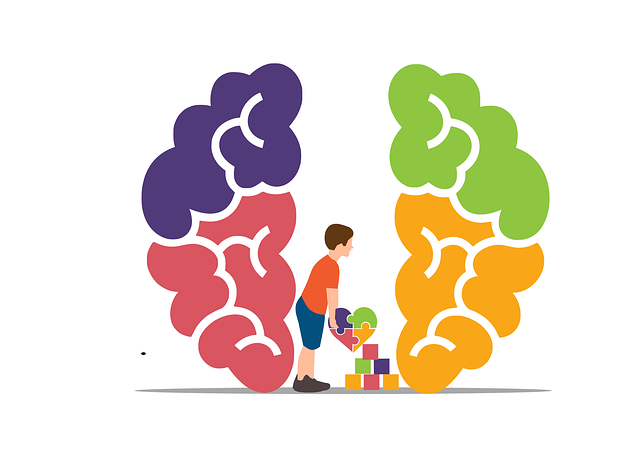Mental health policy is a powerful tool for advocacy, shaping access to care, resource allocation, and societal perceptions of mental wellness. By analyzing legislation, guidelines, and funding, advocates can identify gaps and drive improvements, making mental health a global priority. Parker Play Therapy, a child-focused approach pioneered by Dr. Virginia Parker, exemplifies this; it uses play as a therapeutic tool for emotional expression, processing, and healing, enhancing emotional intelligence and coping skills. Advocates pushing for policy integration of such innovative practices can increase accessibility for vulnerable populations. Collaboration among healthcare professionals, policymakers, community organizations, and individuals with lived experiences drives holistic mental health reform, normalizing conversations and reducing stigma through programs like Stress Management Workshops and Mood Management initiatives. Incorporating Parker Play Therapy into community initiatives can lead to tailored coaching programs, fostering better communication and improved mental health outcomes for all.
Mental health policy analysis and advocacy are vital components in fostering comprehensive care and community well-being. This article explores key aspects of mental health governance, including the foundational understanding of policies, their profound impact on access to care, and the essential role of play therapy as a therapeutic approach.
We delve into effective strategies for advocacy, highlighting Parker Play Therapy as a powerful tool for policy change and community engagement, ultimately aiming to revolutionize mental healthcare accessibility.
- Understanding Mental Health Policy: A Foundation for Advocacy
- The Role of Play Therapy in Addressing Mental Health Concerns
- Analyzing Current Policies and Their Impact on Access to Care
- Building Effective Advocacy Strategies for Mental Health Reform
- Parker Play Therapy as a Tool for Policy Change and Community Engagement
Understanding Mental Health Policy: A Foundation for Advocacy

Understanding Mental Health Policy is a cornerstone for effective advocacy, especially when considering the profound impact it has on individuals’ lives. Mental health policies shape access to services, resource allocation, and societal attitudes, all of which influence help-seeking behaviors. By scrutinizing these policies, advocates can identify gaps and areas requiring improvement, ensuring that mental wellness becomes a priority in communities worldwide.
This process involves analyzing legislation, guidelines, and funding allocations related to mental health. For instance, advocating for increased access to evidence-based practices like Parker Play Therapy can be informed by policy changes. Moreover, promoting the development of Public Awareness Campaigns and Mental Wellness Coaching Programs contributes to building empathy and reducing stigma, essential components in fostering supportive environments for mental health.
The Role of Play Therapy in Addressing Mental Health Concerns

Play Therapy, as pioneered by Dr. Virginia Parker, offers a unique and effective approach to addressing mental health concerns in both children and adolescents. This therapeutic method recognizes the power of play as a natural way for individuals to express themselves, process emotions, and heal. By creating a safe and supportive environment, therapists can help clients explore and manage their mental health challenges through imaginative play, storytelling, and creative activities.
One of the key benefits of Parker Play Therapy is its ability to enhance emotional intelligence and build confidence. Through play, individuals can learn to identify and express their feelings, develop coping strategies, and improve their problem-solving skills. This early intervention approach not only supports mental well-being but also contributes to better risk assessment for mental health professionals by providing valuable insights into clients’ inner worlds. By integrating emotional intelligence and boosting confidence, Play Therapy empowers individuals to navigate life’s challenges more effectively.
Analyzing Current Policies and Their Impact on Access to Care

Mental health policies play a pivotal role in shaping access to care and overall well-being. By analyzing current policies, we can uncover barriers that hinder individuals from receiving the support they need. This is particularly important for vulnerable populations who may face systemic obstacles in accessing quality mental healthcare. For instance, Parker Play Therapy offers a unique approach to therapy, emphasizing the significance of play as a therapeutic tool, especially for children and adolescents. However, policy implications must be considered to ensure such innovative practices are integrated into mainstream services, thereby improving accessibility.
Evaluating the impact of these policies is crucial. Self-Care Routine Development for Better Mental Health can be a game-changer in empowering individuals to take charge of their well-being. Simultaneously, Risk Management Planning for Mental Health Professionals is essential to safeguard practitioners while offering quality care. Furthermore, implementing Empathy Building Strategies within mental health services can foster stronger patient-therapist relationships, enhancing the overall effectiveness of treatment.
Building Effective Advocacy Strategies for Mental Health Reform

Mental health advocacy is a powerful tool for driving change and improving access to quality care. When designing effective strategies for mental health reform, it’s essential to involve diverse stakeholders, including healthcare professionals, policymakers, community organizations, and individuals with lived experiences. Collaboration fosters a holistic approach, ensuring that advocacy efforts are well-rounded and address the multifaceted nature of mental wellness.
One successful strategy involves integrating evidence-based practices like Parker Play Therapy into mental health services. By combining traditional therapy techniques with play-based interventions, especially beneficial for children and adolescents, mental health professionals can cater to a broader range of needs. Additionally, advocating for Stress Management Workshops within schools and community centers empowers individuals with coping skills development, while promoting Mood Management programs can help normalize conversations around mental health and reduce the stigma associated with seeking support.
Parker Play Therapy as a Tool for Policy Change and Community Engagement

Parker Play Therapy offers a unique and powerful approach to fostering mental wellness within communities, making it an invaluable tool for policy advocates. By engaging children through play, this therapy method can help identify and address early signs of emotional distress or mental health issues. This proactive strategy is essential in developing effective policies aimed at supporting mental health and well-being, especially among vulnerable populations. Through interactive games and imaginative activities, play therapists create a safe space for kids to express their feelings and emotions, promoting self-awareness and resilience from a young age.
Incorporating Parker Play Therapy into community initiatives can lead to significant policy changes. For instance, it can inform the development of mental wellness coaching programs tailored to different age groups. These programs can then be integrated into schools, community centers, and local support networks, ensuring that children and their families have access to much-needed resources. Additionally, play therapy sessions can enhance communication strategies between parents, caregivers, and professionals, fostering a collaborative environment for better mental health outcomes.
Mental health policy analysis and advocacy are essential components of creating accessible, comprehensive care systems. By understanding the foundational principles of mental health policy, leveraging innovative therapies like Parker Play Therapy, and analyzing existing policies, we can develop effective strategies for reform. These efforts not only enhance access to care but also foster community engagement, ultimately revolutionizing support for mental well-being.













